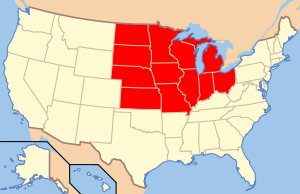2003 Midwest monkeypox outbreak
Outbreak of monkeypox in the United States in 2003
2003 Midwest Monkeypox Outbreak
The 2003 Midwest monkeypox outbreak was a significant event in the United States, marking the first time that human monkeypox was reported outside of Africa. The outbreak occurred in the Midwestern United States, primarily affecting the states of Wisconsin, Illinois, Indiana, Kansas, Missouri, and Ohio.
Background
Monkeypox is a viral zoonotic disease caused by the monkeypox virus, a member of the Orthopoxvirus genus, which also includes the variola virus (the cause of smallpox). The disease is endemic to Central and West Africa, where it is typically transmitted to humans from wild animals such as rodents and primates.
Transmission
The 2003 outbreak in the United States was traced back to a shipment of animals from Ghana that included Gambian pouched rats, dormice, and rope squirrels. These animals were imported by a Texas animal distributor and subsequently housed with prairie dogs, which are native to North America. The prairie dogs became infected and were sold as pets, leading to human cases of monkeypox.
Outbreak
The outbreak began in early June 2003, with the first human cases reported in Wisconsin. A total of 47 confirmed and probable cases were identified during the outbreak. Symptoms in humans included fever, headache, muscle aches, and a characteristic rash. The rash typically progressed from macules to papules, vesicles, pustules, and finally crusts.
Response
The Centers for Disease Control and Prevention (CDC) and state health departments quickly responded to the outbreak. Measures included the quarantine of infected animals, the tracing of animal and human contacts, and the provision of smallpox vaccine to individuals at risk, as the vaccine is known to provide cross-protection against monkeypox.
Impact
The outbreak highlighted the risks associated with the importation of exotic animals and led to increased regulations. The CDC and the U.S. Food and Drug Administration (FDA) issued a joint order banning the importation of African rodents and the sale, distribution, transport, and release of prairie dogs and six specific genera of African rodents.
Prevention
Preventive measures include avoiding contact with animals that could harbor the virus, practicing good hygiene, and using personal protective equipment when handling potentially infected animals. The smallpox vaccine is effective in preventing monkeypox and was used during the outbreak to protect healthcare workers and close contacts of infected individuals.
Related pages
Transform your life with W8MD's budget GLP-1 injections from $125.
W8MD offers a medical weight loss program to lose weight in Philadelphia. Our physician-supervised medical weight loss provides:
- Most insurances accepted or discounted self-pay rates. We will obtain insurance prior authorizations if needed.
- Generic GLP1 weight loss injections from $125 for the starting dose.
- Also offer prescription weight loss medications including Phentermine, Qsymia, Diethylpropion, Contrave etc.
NYC weight loss doctor appointments
Start your NYC weight loss journey today at our NYC medical weight loss and Philadelphia medical weight loss clinics.
- Call 718-946-5500 to lose weight in NYC or for medical weight loss in Philadelphia 215-676-2334.
- Tags:NYC medical weight loss, Philadelphia lose weight Zepbound NYC, Budget GLP1 weight loss injections, Wegovy Philadelphia, Wegovy NYC, Philadelphia medical weight loss, Brookly weight loss and Wegovy NYC
|
WikiMD's Wellness Encyclopedia |
| Let Food Be Thy Medicine Medicine Thy Food - Hippocrates |
Medical Disclaimer: WikiMD is not a substitute for professional medical advice. The information on WikiMD is provided as an information resource only, may be incorrect, outdated or misleading, and is not to be used or relied on for any diagnostic or treatment purposes. Please consult your health care provider before making any healthcare decisions or for guidance about a specific medical condition. WikiMD expressly disclaims responsibility, and shall have no liability, for any damages, loss, injury, or liability whatsoever suffered as a result of your reliance on the information contained in this site. By visiting this site you agree to the foregoing terms and conditions, which may from time to time be changed or supplemented by WikiMD. If you do not agree to the foregoing terms and conditions, you should not enter or use this site. See full disclaimer.
Credits:Most images are courtesy of Wikimedia commons, and templates, categories Wikipedia, licensed under CC BY SA or similar.
Contributors: Prab R. Tumpati, MD

